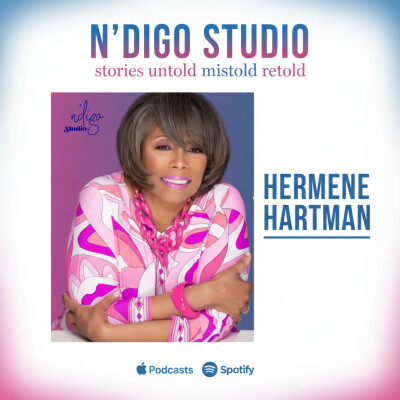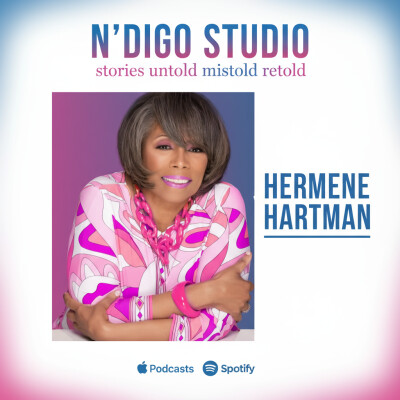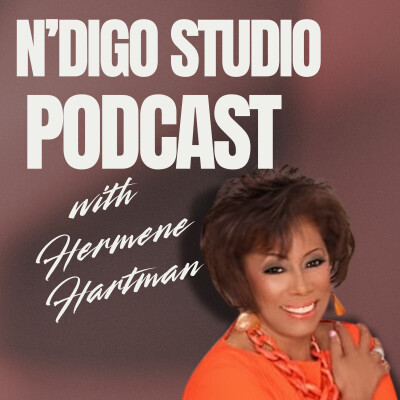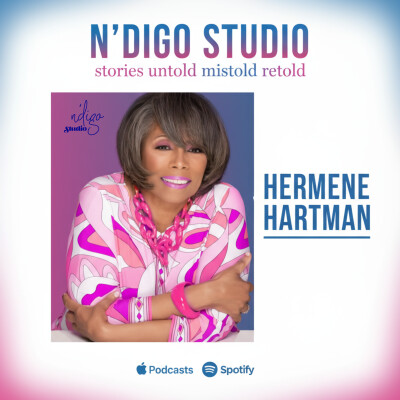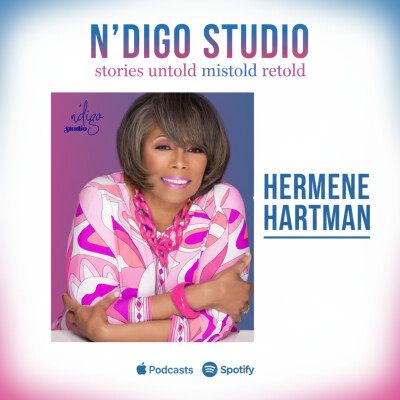- Speaker #0
I want to tell you a story. The picture that you see on the screen is of Whipped Peter. He was a slave from New Orleans. He was terribly, terribly beaten. He ran away to join the Army in 1863. As he was being examined for his physical, the welts on his back were exposed, and the photo was taken and became known as the Scrooge back. The photo was widely circulated, and I'm sure you have probably seen it in some history books. The National Gallery of Art in Washington had this picture. The picture was ordered removed from the Park Service, labeled as inappropriate. The president's executive order said that it had come under the influence of a divisive, race-entrenched ideology. It showed slavery as being negative, and it did not enlighten on the brightness of America. So what happens? What happens when our stories disappear, when history is rewritten? or even erase. We're going to dive into a compelling conversation on erasure as we look at it from the standpoint of museums and education. Our guest today, we're going to be talking to Clanae Haspeth. She's formerly the Chicago's Cultural Commissioner. She's also a museum specialist who spent her career preserving. and protecting the cultural record. Also with us is Dr. Brad Braxton, the president of the Chicago Theological Seminary and a former curator of African-American religious life at the Smithsonian National Museum of African-American History and Culture. And our lawyer today is Victor Henderson, and he's going to look at this from a legal perspective. So, Clanae, let me start with you. What does it mean when our exhibits, when when our pictures, when our artifacts are taken out of a museum with intention and purpose, not the loan, but with intention and purpose of telling our story. What does that really mean?
- Speaker #1
That means we're in trouble.
- Speaker #0
What's the trouble?
- Speaker #1
That means that our stories visually and the ability for people to find a little bit more about the world that we live in is being erased wholly and it's quite frightening. Museums are living, breathing spaces. They aren't telling the whole entire story, but they give us something to ground ourselves in when we're looking for knowledge, particularly the African American experience. So removing things, it's dangerous.
- Speaker #0
So Dr. Braxton, you look at this from not only the museum curator side, but also the spiritual side. What's it mean for us? What does it do to us? How does it disturb our history?
- Speaker #2
When we have fragmented stories, when we have fragmented truth, we will have a fragmented nation. In order for there to be a whole nation, we must have the whole truth, and even those parts of truth that are inconvenient and difficult.
- Speaker #0
Victor, from a legal vantage point, what's it mean and how can we fight it?
- Speaker #3
When you look at history, You know, the people who tell the stories are the ones who win the wars. And so, you know, this past election we lost it, and so the people who are now in power are telling the story. And it's always been that way and will always be that way, which makes it imperative for us not to rely on other people to tell our story. So we have to be vigilant about telling our own stories and not rely on the people who want to oppress us, the people who want to keep us down. If we think that the people who want to keep us down are going to tell the story the right way, from a legal perspective, that's just completely false.
- Speaker #0
So some of the things I've read that have been taken out of the museum, Harriet Tubman's hymnal, something from a slave cloth, something that a slave actually made, something from Frederick Douglass, the Greensboro. exhibit with the with the stools and they got a lot of flack about that and I think that that was put back. Jackie Robinson. Not Jackie Robinson as a ballplayer, but Jackie Robinson as a soldier was removed from the military exhibit. Okay, so when these things are removed, how do we get them back in? Do we protest it? Do we raise hell about it? Or do we just accept it and, oh well, what happens?
- Speaker #2
Acquiescing, being quiet, is a non-option.
- Speaker #0
Thank you.
- Speaker #2
Frederick Douglass made it very clear. Power concedes nothing. Without a demand. And what I love about this multi-dimensional conversation is that we are demonstrating that the demand must come from multiple places. Media, the law, cultural meaning making, education, various forms of protest and not simply protest for the sake of protest, but protest that creates the alternative.
- Speaker #0
So I must tell you, since you brought it up, That I called some museum people to be on this program and they refused. They would not. I don't, it was fear. Uh, and we shouldn't talk. And I'm, I was objecting to like, you must talk. Uh, but they refused to be on the program, which I thought very, very interesting. What can the public do? What can John Q. Doe do?
- Speaker #1
Always stay involved. Don't wait till there's a crisis. When I was at the DuSable Museum and it was hard to get people just even donate and to activate the space. That's a nationwide trend. We tend to respond when there's a crisis. Things are being pulled out. I was just in DC last month and it was eerie. You didn't even see people that looked like us actually in there. And so one thing I would say is stay, you can't, you have to stay active all the time. All the time. Start locally too. Nationally it's important for us to stay active. in voting, but locally we also have to be as engaged all the time because when they take those pieces out and they're not on display, that hurts us immediately and then it hurts the global kind of understanding of what it means to be black in America.
- Speaker #0
Dr. Braxton, museums are also supposed to educate. So sometimes with tough truths, with hard truths, with reality, how do we deal with that?
- Speaker #2
Thank you for that question. There is a philosopher who suggests, I cannot tell you what I should do or what you should do until I can tell you the stories of which I am a part. It is our stories that help to create our identity. And so a resilient community, a resilient nation is a nation, a community that has resilient stories. So we are less of a people. When we don't have access to Harriet Tubman's hymnal. We are less of a people when our educational journey does not talk about brave college students who sat in seats there, lunch counters, when hatred was literally being poured over them, and they persevered. So yes, this is a cultural story, and yes, this is a human story, and education should make us better people.
- Speaker #4
Whether you're considering an electric vehicle at work or at home, making the switch may not be as complex or expensive as you think. The tools, resources, and rebates available at ComEd.com slash EV make transitioning to an electric vehicle easier and more cost-effective than ever before. Charge into the future at ComEd.com slash EV.
- Speaker #5
Welcome to Hell's Kitchen, Broadway's hit musical from Alicia Keys.
- Speaker #6
Every song, If I Ain't Got You, Empire State of Mind, is all in the show.
- Speaker #5
Meet Allie, a 17-year-old girl full of fire. Meet the musical mentor who changes her life and her family, who lifts her up. With exhilarating choreography, Hell's Kitchen is all about finding yourself, your purpose, and the people who inspire you. Hell's Kitchen, playing at the James M. Niederlander Theater, November 11th through 30th.
- Speaker #4
At ComEd, we understand a little help can really make someone's day. That's why we provide financial assistance and billing options to help you pay and manage your electric bill. Use the ComEd Smart Assistance Manager to discover bill assistance and savings options designed with you in mind.
- Speaker #5
Welcome to Hell's Kitchen, Broadway's hit musical from Alicia Keys.
- Speaker #6
Every song, If I Ain't Got You, Empire State of Mind, is all in the show.
- Speaker #5
Meet Allie, a 17-year-old girl full of fire. Meet the musical mentor who changes her life and her family, who lifts her up. With exhilarating choreography, Hell's Kitchen is all about finding yourself, your purpose, and the people who inspire you. Hell's Kitchen, playing at the James M. Niederlander Theatre, November 11th through 30th.
- Speaker #0
Victor, is there any way that you can put a law in effect going forward that museum exhibits cannot be taken down?
- Speaker #3
Yes and no. The law isn't static. It's not wooden. And that's good and bad.
- Speaker #0
It changes.
- Speaker #3
Yes. If the law was wooden, we'd still be slaves. If the law was wooden, we'd still be sitting in the back of the bus. So it's not wooden. The downside to it being not wooden is that it can also be used against us. We were slaves. We were sitting in the back of the bus. Our history is in the process of trying to be erased because there are people who don't want us to be empowered like you're saying. This is a war. We've always been in a war since we got here in 1619. Many of us may not know that. It's ongoing, isn't it? It's every day. You know, Malcolm said freedom ain't free. We're trying to be free. We're trying to get to the promised land each and every day. It's not as if, you know, what happened to our ancestors in the 50s is behind us or the 1920s is behind us. We were going to lynched or in the 1850s when we were like, no, we're in a battle now at this moment. And so this really is a fascinating time for us from a legal perspective. Because you have to put people in office, whether it's prosecutors, whether it's presidents, who will carry out what you think is a fair vision. Whether it's a lawyer. Whether it's a lawyer. All of us. But I mean, this is a battle, and so you either have to embrace the fight, like the fight, understand that we're not meant to be here forever.
- Speaker #0
As you have curated in museums, as you have curated exhibits, as you have made the determination as to what goes in the exhibit, How do you pick and choose that? How do you make those decisions? Those are tough decisions. How do you make those decisions?
- Speaker #1
In a collaborative way because there's so much to go in. Right. Less than 10% of what an institution holds is out on display. And then when we look at giant institutions, especially those that aren't funded primarily by the government, it's even more selective. So I mean it's just about the storytelling. What, you know, who's coming through the door. That's why it's important for us to come through the door. For us to have a constant say, but you know, through scholarship, through sometimes a response, filling in gaps. So it's sometimes it's aesthetically what makes sense. So that's been my curatorial experience and theory.
- Speaker #0
What exhibit, what did you put in the National Museum of African American History to discuss American, Black American life? What one thing is the most powerful thing you did?
- Speaker #2
Those who came to the National Museum before I joined the staff made the incredibly courageous decision to place the casket of Emmett Till there in the museum. So the actual casket is there. The actual casket has been exhumed. And I have had the privilege in what I call our nation's temple to freedom. to take people through and that's the one place in the museum that photography is not allowed. And what we did, particularly those of us who had background in religion and spirituality, was literally to take people through that experience. I have seen people from all walks of life just break down because as my fellow curator at the Smithsonian, Dr. Eric Williams, said you have to feel history. So you make decisions to allow people to field history and the most important thing that I did was working particularly with high school and college students and Saying the person who was in this casket was about your age And are you ready for the revolution because it may cost us our lives if we really want to be free
- Speaker #0
Cluney, what's been your one? exhibit that you're proudest of?
- Speaker #1
Oh, gosh. I think the rewriting history by Fabiola Jean-Louis at Du Sable. She's a Haitian artist, and she uses paper because, to your point, the law can either change something, put it back. It can do some things. It can't do things. And long story short, she creates these sculptures and writes the Constitution on them. In paper.
- Speaker #0
She writes the Constitution.
- Speaker #1
She writes the Constitution. So she makes full length gowns, puts black women in them, and writes the Constitution on them.
- Speaker #0
Never, ever to think that museums, as a body, become political. But here we are, and it is political. And it didn't just get political. It's been political.
- Speaker #1
But I also like to say. There were a lot of museums in people's homes, at kitchen tables, in their basements. There were a lot throughout the nation that we still have to, we still need to support. And so I want to make sure that wherever you are, if there is a space, to make sure that we are supporting those in addition to the national museums.
- Speaker #0
And that's what Lonnie said. The history is in the attic. The history might be in the basement. I've got to pull it out. That's right. And thank goodness he did. Thank you for being with us. Thank you, Clinay. Thank you, Dr. Braxton. Thank you, Victor. We've been talking about erasure, looking through that historical lens. When does history get erased? Who pays the price? And how do we reclaim the narrative? And remember, bottom line, it can become political. I'm Hermine Hartman with Indigo Studio. Don't go away.
- Speaker #4
Whether you're considering an electric vehicle at work or at home, the tools, resources, and rebates available at commed.com slash EV make transitioning to an electric vehicle easier than ever before.
- Speaker #5
Welcome to Hell's Kitchen, Broadway's hit musical from Alicia Keys.
- Speaker #6
Every song, If I Ain't Got You, Empire State of Mind is all in the show.
- Speaker #5
Meet Allie, a 17-year-old girl full of fire. Meet the musical mentor who changes her life and her family, who lifts her up with exhilarating choreography. Hell's Kitchen is all about finding yourself, your purpose, and the people who inspire you. Hell's Kitchen, playing at the James M. Niederlander Theatre, November 11th through 30th.
- Speaker #4
At ComEd, we understand a little help can really make someone's day. That's why we provide financial assistance and billing options to help you pay and manage your electric bill.
- Speaker #5
Welcome to Hell's Kitchen, Broadway's hit musical from Alicia Keys.
- Speaker #6
Every song, If I Ain't Got You, Empire State of Mind, is all in the show.
- Speaker #5
Meet Allie, a 17-year-old girl full of fire. Meet the musical mentor who changes her life and her family, who lifts her up. With exhilarating choreography, Hell's Kitchen is all about finding yourself, your purpose, and the people who inspire you. Hell's Kitchen, playing at the James M. Niederlander Theater, November 11th through 30th. Indigo Studio,
- Speaker #0
in the Indigo Studio. The concept of erasure is not happening just in museums. It's also happening in education at all levels. We're going to look at a program today, the Black Student Success Plan, a new program at Chicago Public Schools. Federal funds for this program are being... question from the Parents Defending Education, a Virginia-based group claiming discrimination. We're going to talk to educators. We're going to talk to educators who put this program together and look at what it does, what its intent is, goals and objectives, but we're also going to look at how it could be erased. So now we're going to talk to educators about education and erasure. And with us Dr. Carol Collins. She is a former principal with Chicago Public Schools and we're going to talk to Gerald Murrow, he too principal, former of Chicago Public Schools, and Valerie Leonard from the non-profit organization Utopia. And our residential lawyer is with us, Victor Henderson. So let me ask you all a question about the Black Student Success Plan. You all were all the developers. of this plan. Tell me about this plan for Chicago Public Schools and how it came about.
- Speaker #7
It started, it really started years ago. Because black student success in this district has been a problem since the early 2000s. It has really taken root as of late and the plan itself exactly was put into legislation around the elected school board. There were people and pioneers around this city and various aspects of it, civically, community, educators, who realized this need was there and it needed to be addressed.
- Speaker #0
Ms. Leonard, tell me about what the goals and objectives of the plan are. I want to get into the plan. What are the objectives of the plan?
- Speaker #8
Yeah, the main objective of the plan is to close the gap between black students and the rest of the system. And how do we do that? We do it through a number of ways. We can do it by reducing the school to prison pipeline. Another way we can do it is to make sure that our children have teachers that look like them. I came of age in the 60s. My dad was a teacher. And I think during the 60s, You had more black achievement when you had more black men in the system and I think historically 60s and 70s we made our greatest gains and you know so that is clearly one of the practices that we want to keep in place. We also want to make sure too that the teachers when they're hired they have the skills not not only the technical skills to teach but they're teaching in a way. that is culturally relevant so our children again can relate.
- Speaker #0
History is one of the things being taught, am I correct? Definitely,
- Speaker #9
student experiences. It's a three-pillared perspective that the plan has taken, which is student experiences, high quality, culturally relevant, respectful of the student's backgrounds, the family, their value system, student experiences. Also, adult capacity is critically important. Are teachers prepared to provide rigorous instruction?
- Speaker #0
What does adult capacity mean?
- Speaker #9
The preparation of teachers as it relates to statistically, often in African American communities, and this is statistically across the country, teachers have often not reflected the level of quality, depending on the programs. Often you have a lot of experienced teachers and in fact 80%, roughly 80% of all the teachers in this state and nationally over 70% are middle class white females. So we're talking about what type of classes are black teachers teaching, where are they teaching and what type of institutions. So the idea of adult capacity is critically important as it relates to teacher preparation and long standing teacher development and teacher supports. because in a lot of our schools where primarily African-American students are served, teachers may not have the level of resources or support.
- Speaker #0
So one of the things that you all point out that's really vital, that I think you've had success, that works, that we know it works, we know it statistically, it's important that black students have black teachers. You see higher scores, you see cultural relevancy, you see historical teaching. Why is that and why is that so important?
- Speaker #7
Representation matters. You cannot be what you cannot see. I was blessed from K through 12 to have numerous African-American teachers who were not only physical education teachers. They were in leadership, they were science teachers, they were math teachers. And I saw somebody who looked like me. I saw somebody who could relate to me. I saw someone who could encourage me. And that particular time, we name it now as target universalism, where each group gets the supports that they need. That was being done a long time ago. We've just named it and framed it now in Chicago Public Schools and in research around target universalism. Now our students really need it. They really need to see someone that looks like them. They really need to see someone that understands them. That is why HBCUs have been effective for so many years.
- Speaker #0
A Virginia-based group, Parents Defending Education, calls the program discriminatory. How can a program with such Specificness, such target to fulfill a need of what has not been done for years, all of a sudden is discriminatory.
- Speaker #3
It's not discriminatory. When I hear the educators talk, it's just blowing my mind away. Remember during slave times they didn't want us to learn how to read.
- Speaker #0
At all.
- Speaker #3
It was illegal. Because when you become enlightened, when you get knowledge, you're dangerous. Also you're uncontrollable. And because you're uncontrollable, you're dangerous. And so this Virginia-based group is no different than, you know, and I just have to keep it real, it's no different than the slave masters back, you know, during when we were enslaved. They don't want us to become educated. Either Miseducation of the Negro, Carter G. Woodson. I mean this is just the modern day version of trying to keep us down since 1619. And so what you guys are doing really, or all of us who've been educated, it's laudable because this is about empowering black people and trying to lift us up while they are a group of people who want to keep us down. That's what this is.
- Speaker #0
So the program itself, Black Student Success Plan was not funded. However, funding... was to be withheld by the federal government if the program progressed. Explain that to me.
- Speaker #7
Well, one of the things that the federal government is proposing in Chicago public schools is if you keep pursuing black student success, then they threaten to take money away from our magnet school programs, our gifted programs. So that is what happened.
- Speaker #0
How important is testing? How important is test scores?
- Speaker #9
Much of the success, whether it be Chicago Public Schools or nationally in public schools, is focused on standardized test assessment as one indicator.
- Speaker #0
Another data point.
- Speaker #9
Yes, another data point. And then we have to, you know, from the university level, we begin to look at, when I look at assessment, I teach assessment to principal and superintendent candidates. We have to ask about the legitimacy of the assessment. Is the assessment biased? We have to begin to look at the preparation and the ability for the children to be successful on a particular standardized assessment. We have to look at the quality of prior instruction that is preparing them for the assessment. We have to look at their ability to understand test-taking skills and test-taking environment because all of our homes are different. Some students are not used to long sustained periods of concentration. and test language is also different than what students have been exposed to. So when you ask that question, the answer is they're very important, but the legitimacy, personally, is my own belief system, being in the academy now, the legitimacy of whether or not they are or should be important is what we should question.
- Speaker #0
Liberal policies in education. New term from the Trump administration. What is liberal policies in education?
- Speaker #8
What is the meaning of it? What do you think it means?
- Speaker #7
I think...
- Speaker #0
Guilty, not guilty.
- Speaker #7
The meaning of what they're trying to interpret it as is one thing, but to Victor's point, it's just another mechanism that they're using to make sure that they keep a bottom-cast system, which is what this was created on. So they take those type of policies, they even take the assessments, and they use it to categorize or compartmentalize. These children are based off this. It's quite funny. If you look at Chicago Public Schools' application, they don't actually do ACT score.
- Speaker #0
Thank you for being with us. This program has talked about erasure. Erasure's not just at the museum level. It is at educational level. We're seeing it. It's also in media, too. You all should be very proud of putting such a program together. And now we just got to figure out, Mr. Lawyer, how do we move it forward? We got nobody to sue. We can't sue nobody.
- Speaker #3
We'll find a way.
- Speaker #0
Okay. But we find, I think the moral of the lesson, like for real, in all of this erasure, politics matters. Voting matters because all of this gets down to be a political phenomenon. Thank you for being with us and thank you for fine work.
- Speaker #10
in the ghost studio in the ghost studio come on in sit right down talk about things around the town in the ghost studio

